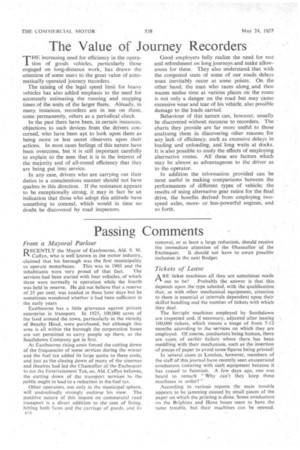The Value of Journey Recorders
Page 52

If you've noticed an error in this article please click here to report it so we can fix it.
rTHE increasing need for efficiency in the opera tion of goods vehicles, particularly those engaged on long-distance work, has drawn the attention of some users to the great value of automatically operated journey recorders.
The raising of the legal speed limit for heavy vehicles has also added emphasis to the need for accurately estimating the running and stopping times of the units of the larger fleets. Already, in many instances, recorders are in use on these, some permanently, others as a periodical check.
In the past there have been, in certain instances, objections to such devices from the drivers concerned, who have been apt to look upon them as being more or less secret observers upon their actions. In most cases feelings of this nature have been overcome, but it is still important carefully to explain to the men that it is in the interest of the majority and of all-round efficiency that they are being put into service.
In any case, drivers who are carrying out their duties in a conscientious manner should not have qualms in this direction. If the resistance appears to be exceptionally strong, it may in fact be an indication that those who adopt this attitude have something to conceal, which would in time no doubt be discovered by road inspectors. Good employers fully realize the need for rest and refreshment on long journeys and make allowances for these. They also understand. that with the congested state of some of our roads delays must inevitably occur at some points. On_ the other hand, the man who races along_ and then wastes undue time at various places on the route is not only a danger on the road but may cause excessive wear and tear of his vehicle, also possible damage to the loads carried.
Behaviour of this nature can, however, usually be discovered without recourse to recorders. The charts they provide are far more useful to those analysing them in discovering other reasons for any lack of efficiency, such as excessive delays in loading and unloading, and long waits at docks. It is also possible to study the effects of employing alternative routes. All these are factors which may be almost as advantageous to the driver as to the operator.
In addition the information provided can be most useful in making comparisons between the performances of different types of vehicle; the results of using alternative gear ratios for the final drive, the benefits derived from employing twospeed axles, moreor less-powerful engines, and so forth.








































































































































